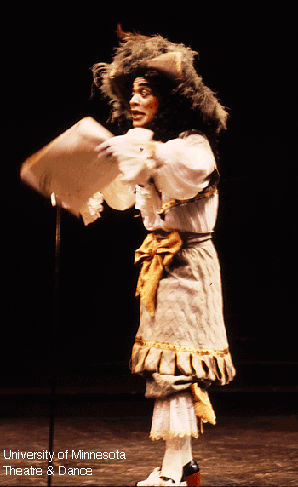The Open Theatre: An Introduction to Theatre was first conceived as Drs. Knowles and Devlin were both prepping summer Introduction to Theatre courses. We were struggling to find a textbook that accomplished everything we needed, was accessible and affordable, and offered dynamic educational resources. As we talked we realized we had wildly different opinions about what an Introduction to Theatre class should accomplish, highlighting the need for something more mutable than a traditional textbook.
Simultaneously, both of our institutions were encouraging the exploration of adopting Open Educational Resources in the classroom. In our estimation, we believe Open Educational Resources are the next great disruptive practice in higher education, and we see an ethical obligation to our students to keep the cost of textbooks low.
Out of these discussions came the idea of creating an open-source (free and accessible), completely customizable Introduction to Theatre book, The Open Theatre. Open became an operative and thematic word for us and keyed into all the needs that we were dealing with: Open Educational Resource (OER), open to change based on instructor design, and open to different kinds and types of content that could/should be included. We envisioned a book that, of course, includes standardized academic materials on basic topics of theatre but might also include scripts, interviews (video or text), organizational charts, manifestos, dramaturgy notes, reviews, historical essays, production case studies, and more. We conceived of a text that actively and creatively resisted dominant narratives offered in an introductory level text: what does an open concept of theatre mean?
As conversations continued, our philosophical investment in the ideas of Open Educational Resources became more clear. Neither of us wanted to write a book to make money, nor did we really think that was possible. Creating a living book and offering it free of charge to anyone interested was highly desirable. It offered the chance to take at least some of the cost out of a theatre course and provide an opportunity to the next generation. The opportunities afforded by cutting costs in higher education are attractive, but we both believe the idea of a living book is more exciting, and the product will ultimately be more responsive and timely. Open, in this case, also means taking the content we are putting together and reworking it in anyway you choose (so long as you remain under a Creative Commons-Attribution-NonCommercial-ShareAlike license.) It’s about sharing and disseminating knowledge with very few strings attached.
We are committed to creating an open, inclusive, democratic, dynamic, and diverse set of resources for students and educators alike.


{ 1 comment… read it below or add one }
Helllo; Congratulations first of all. I do not teach but do research on theater history in Lima in the first 5o years of xx century. I have just finished a book called El teatro popular en Lima: zarzuelas, sainetes y revistas 1890-1945. There is almost no theatre research in Peru acoording to what you state in your introductory book Theatrical Historiography: Critical Interventions. That book has been indispensable in my work. If you are interested Ministerio de Cultura del Peru will publish my introductory book in its web very soon. Publication in line and some money for the printed version publication has been a award to five of us researchers in Estudios Escenicos by the Infoartes Department of Ministerio de Cultura in Peru. Research in theater history is very demanding but also very rewarding beacuse it helps you to understand society much more. Somewhere I read that theatre is the art most related to ideology. True fact. Best wishes in your new adventure. Gustavo von Bischoffshausen.